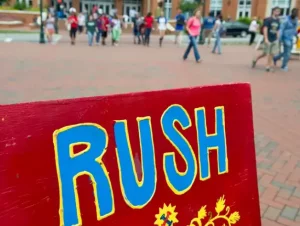Rush is a special time for freshmen at many colleges and universities.
It is a term that refers to the process of students pledging to join one of the fraternities or sororities at their college or university. Rush begins before the beginning of the school year and carries on until the first day of classes.
What is Rush Week in College?
Rush is a process similar to recruitment in high schools and during the beginning of the freshman year.

Rush is when you’ll be actively asked questions about why you want to join that particular group.
You will also be asked to engage in events, parties, and other activities in the fraternity or sorority.
It is the week at the beginning of the school year when fraternities and sororities host parties and events to attract new members.
It usually ends with a “bid day” when potential new members (PNMs) get the results of their bids or invitations to join a particular group.
What Happens during the Rush Week?
Rush events are typically scheduled for the first few days of classes so that students can help their friends find out about them.
For example, if you are a member of the stamina fraternity, you might have a party on Wednesday night for anyone who wants to come by and hang out.
You might also attend other events where your fraternity brothers will invite guests and talk about all the great things about joining.
During rush week, people will often go from house to house, meeting new people and talking about what each organization has to offer.
This helps them decide which one they want to join. Some schools have an online system that allows students to look up information about each fraternity or sorority to decide before they even get to campus.
Causes of Rushing in College
Students’ rush is varied, but the most common is that they want to be a part of something bigger than themselves.
The first cause of rushing into college is that people want to feel like they are a part of something bigger than themselves. Rushing is a great way to do this because you meet new people who have similar interests as yourself.
Another reason people rush is that they want to be around people who are more social than themselves. This can be a great way for them to learn how to be more outgoing and confident when making friends with other people.
The loss of a friend or loved one can also lead to rushing for many people. A person who has lost someone close might feel like they need to do something bigger than themselves to honor that person’s memory.
This can be as simple as joining a sorority or fraternity that would have been important to them before they died or joining an organization or club that their loved one was involved in.
How Does Rush Work at College?
A rush is an annual event organized by fraternities and sororities at colleges across the U.S., Canada, and Australia.

It generally happens during the first few weeks of classes (sometimes as early as August) when new students arrive on campus for orientation week or move-in day.
During Rush, fraternities hold parties to invite prospective members — usually freshmen and women to attend while they get to know each other better.
Women who attend these events are called “rushees.” The men are called “rush chairmen” or “rushing co-chair
The parties are held in different locations on campus depending on which fraternity hosts them (generally off-campus), so you might be invited to attend one or more events if you’re interested.
The rush process may vary from school to school, but usually, it consists of several rounds that you must pass with each organization before you are accepted.
The first round typically involves an event where you are invited to meet with members of an organization and learn more about their values and mission.
This is an opportunity for you to let them get to know you better and find out more about them and their traditions.
You should dress nicely for this event because it will be important for them to see what kind of person you are on the inside and outside.
The second round will either be a social event or an interview with group members who have already been through a rush.
This is another opportunity for both parties to get to know each other better, but it may also include some basic questions about yourself and why you want to join their group.
Rushing can also be a way for people to escape problems at home or school. Many students who rush feel like they don’t fit in with their peers at school or don’t have any friends because they’ve moved around so much and haven’t had time to make new ones.
They often think that joining a group will help them feel more comfortable and less lonely while away from home. Even as you join different groups, remember to plan yourself that you strike a balance between your studies and social life.
Finally, some students rush simply because they want to belong somewhere and find a sense of community among others who share similar interests.
How Much Does it Cost to Rush into College?
The cost of rushing can vary widely based on the type of program offered by your school. If there is no fee associated with participating in this type of program, then it costs nothing at all.
If there is a fee associated with rushing, it will vary depending on how much money your school charges and whether or not they waive this fee for students who need financial assistance with their tuition costs.
You should contact your campus registrar’s office if you need help finding out how much it costs to rush into college and what type of financial aid might be available if necessary.
The price tag of rushing varies based on many factors:
- The Organization’s Budget: Some groups have more money than others, so they can spend more money on new members. If you’re joining an expensive sorority, expect to pay more for rush events.
- The Number of Events You Attend: Some organizations require their members to attend multiple events before they get accepted into the chapter — and this can add up quickly.
To be considered for membership, you might have to attend two or three dinners with different groups or go on group outings like bowling or ice skating.

Make sure you ask about how many events are required before deciding whether or not you want to apply for membership in that organization.
- Your grade point average (GPA): If your GPA is lower than 3.0, some organizations may not invite you back for another event after your first one if they feel that your grades will affect their overall GPA negatively if they accept you as a member.
- Your major: Some majors are more expensive than others — but it’s also true that some majors are more lucrative. According to data from the Bureau of Labor Statistics, the median income for a bachelor’s degree holder is $57,011 per year.
But if you want to make six figures or more, don’t study psychology or sociology. Instead, go into engineering or computer science — or medicine or dentistry — and earn a six-figure salary straight out of college!
- The type of school you attend: Private colleges tend to be pricier than public ones because they don’t get as much government funding (and therefore need higher tuition rates). Private colleges also tend to have smaller student bodies and fewer resources (like dining halls) than public schools do

Joseph is a freelance journalist and a part-time writer with a particular interest in the gig economy. He writes about schooling, college life, and changing trends in education. When not writing, Joseph is hiking or playing chess.
